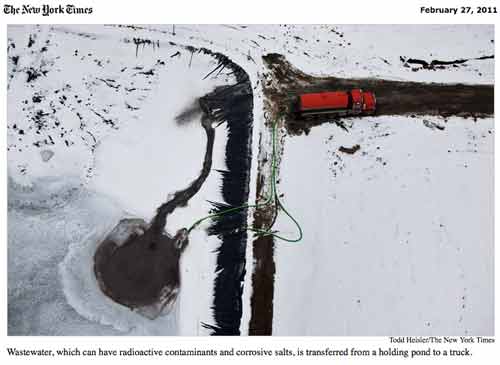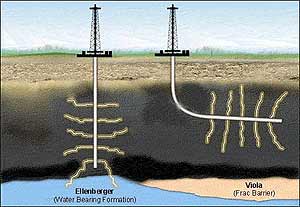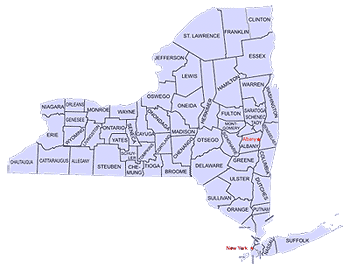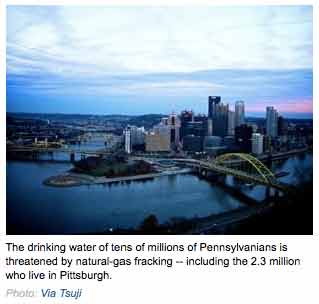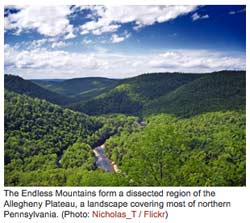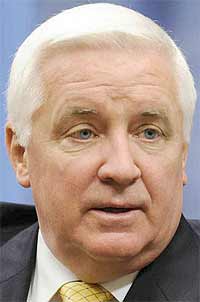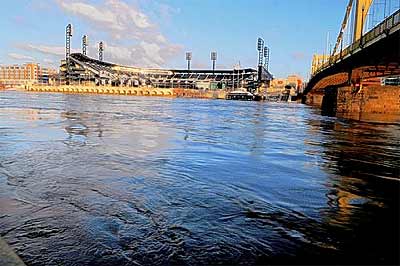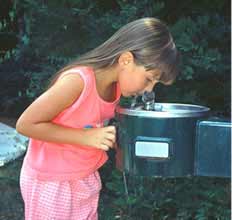Biblio
Two top House Republicans and the Senate’s leading global warming skeptic asked the Supreme Court Monday to throw out a lawsuit seeking to force electric utilities to slash greenhouse gas emissions.
House Energy and Commerce Committee Chairman Fred Upton (R-Mich.), his energy lieutenant Rep. Ed Whitfield (R-Ky.) and Sen. James Inhofe (R-Okla.) submitted an amicus brief Monday in the high-profile American Electric Power v. Connecticut case.
According to the American Journalism Review, Politico is a Washington, D.C. based website and newspaper that focuses on Beltway political coverage, started by veteran Washington Post political reporters John Harris and Jim VandeHei started in January 2007.
See: Glenn Greenwald. May 30, 2008. "The right-wing Politico cesspool". Salon.
I once thought that Politico would be a pernicious new addition to our rotted media culture. Instead, it actually provides a valuable service by packing every destructive and corrupt journalistic attribute, in its most vivid form, into one single cesspool.
See: Smackdown: climate science vs. climate economics
See: EPA in the Crosshairs | Mixplex
See: Beware The Green Dragon! | Right Wing Watch
See: Energy & Commerce Committee Investigates Potential Impacts of Hydraulic Fracturing
...the relatively new drilling method — known as high-volume horizontal hydraulic fracturing, or hydrofracking — carries significant environmental risks.
It involves injecting huge amounts of water, mixed with sand and chemicals, at high pressures to break up rock formations and release the gas.
With hydrofracking, a well can produce over a million gallons of wastewater that is often laced with highly corrosive salts, carcinogens like benzene and radioactive elements like radium, all of which can occur naturally thousands of feet underground. Other carcinogenic materials can be added to the wastewater by the chemicals used in the hydrofracking itself.
While the existence of the toxic wastes has been reported, thousands of internal documents obtained by The New York Times from the Environmental Protection Agency, state regulators and drillers show that the dangers to the environment and health are greater than previously understood.
The documents reveal that the wastewater, which is sometimes hauled to sewage plants not designed to treat it and then discharged into rivers that supply drinking water, contains radioactivity at levels higher than previously known, and far higher than the level that federal regulators say is safe for these treatment plants to handle.
Other documents and interviews show that many E.P.A. scientists are alarmed, warning that the drilling waste is a threat to drinking water in Pennsylvania. Their concern is based partly on a 2009 study, never made public, written by an E.P.A. consultant who concluded that some sewage treatment plants were incapable of removing certain drilling waste contaminants and were probably violating the law.
The Times also found never-reported studies by the E.P.A. and a confidential study by the drilling industry that all concluded that radioactivity in drilling waste cannot be fully diluted in rivers and other waterways.
But the E.P.A. has not intervened...
See: A Life’s Value May Depend on the Agency, but It’s Rising
Walter Hang said this about the NYT report:
"A 2008 drinking water crisis is documented that affected more than 850,000 residents along the Monongahela River near Pittsburgh. When New York imposed its de facto Marcellus Shale horizontal hydrofracturing moratorium, many firms went to drill in Pennsylvania.
Municipal treatment plants were accepting up to 40% of their influent as natural gas drilling wastewater even though they were not equipped to handle that type of waste. So much Total Dissolved Solids (TDS) pollution was discharged in the Monongahela River that the water became unpotable. A 70-mile stretch of the river was impacted."
Hang, Walter. “The New York Times Covers Marcellus Shale Gas Drilling Wastewater/Hold Onto Your Hats.” 2011-02-26 6:42 PM EST: n. pag. E-Mail.
See: Drilling Down | Documents: Natural Gas's Toxic Waste
See: Video: Natural Gas, Polluted Air
See: Interactive Map: Contamination
See: Graphic: Pulling Gas From Rock
Over the past nine months, The Times reviewed more than 30,000 pages of documents obtained through open records requests of state and federal agencies and by visiting various regional offices that oversee drilling in Pennsylvania. Some of the documents were leaked by state or federal officials. Here, the most significant documents are made available with annotations from The Times.
See: Ian Urbina. "Drilling Down Series Index." NYT. Feb. 27, Mar. 2, Mar. 4, 2011.
See also: Freedom of Information in the USA
See also: Do the natural gas industry’s surface water withdrawals pose a health risk?
See also: With Natural Gas Drilling Boom, Pennsylvania Faces an Onslaught of Wastewater
See also: WATER: Gas drilling in huge Appalachia reserve yields foul, briny byproduct - AP
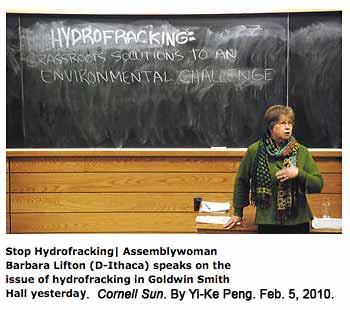
See: Lifton, Barbara. The Assembly. State of New York. "Letter to Governor Cuomo re: Executive Order No. 41 and the Marcellus Shale DRAFT Supplemental Generic Environmental Impact Statement (DRAFT SeEIS), signed by 50 Democratic and Republican representatives." April 13, 2011.
We, the undersigned members of the New York State Legislature, write to thank you for signing a continuation of Executive Order No. 41 as one of your first official acts. That order requires your Department of Environmental Conservation (DEC) to: "analyze comprehensively the environmental impacts associated with high-volume hydraulic fracturing combined with horizontal drilling.." DEC is then required to revise its Marcellus Shale DRAFT SupplementalGeneric Environmental Impact Statement (DRAFT SGEIS) to address widespread criticism of the
original document...
…First, extensive new scientific and technical information has become available since the SGEIS proceeding began nearly three years ago. This includes data gleaned from more than 30,000 pages of documents recently brought to light by the New York Times in a three-part series. We request that you require a public comment period of no less than 30 days to afford interested parties an opportunity to identify sources of new natural gas drilling information that DEC should review in order to revise its DRAFT SGEIS.
...We request that you require the scope of the SeEIS to be expanded to include those issues and all other issues required to fulfill Executive Order No. 41.
The public should be allowed to comment on that matter.
In conclusion, you have repeatedly said you believe horizontai hydrofracturing of Marcellus Shale must only be allowed to proceed in New York State based on "good science." Our requests are entirely consistent with that policy.
See: New York State Assembly Passes Moratorium on Hydrofracking | Governor Vetoes Bill.
In the absence of federal policies that are protective of child development and the ecology of the planet on which our children's lives depend, we serve as our own regulatory agencies and departments of the interior...
Thoughtful but overwhelmed parents correctly perceive a disconnect between the enormity of the problem and the ability of individual acts of vigilance and self-sacrifice to fix it.
Environmental awareness without corresponding political changes leads to paralyzing despair...We feel helpless in our knowledge, and we're not sure we want any more knowledge.
You could call this well-informed futility syndrome. And soon enough, we are retreating into silent resignation rather than standing up for abolition now.
--Sandra Steingraber. Raising Elijah. 2011.
"We shouldn't wreck this place down, right, Mom?"
--Elijah, age six,the author's son.
“Eco-biologist, cancer survivor, activist, mother of two, and author of books about environmental hazards and their effects (including Living Downstream and Having Faith), Steingraber applies her knowledge and philosophy to the challenge of raising children in our toxic, climate-threatened world. She connects many child health issues, including asthma, behavioral problems, intellectual impairments, and pre-term birth to hormone-disrupting, brain-damaging, and otherwise dangerous environmental factors. Chapters tackle weighty problems–diminished fertility; how chemicals infiltrate mothers’ milk; air quality and the ozone hole; neurotoxicology; hydraulic fracturing–and how they affect children and families. Two major themes emerge: first, current environmental policies must change to safeguard and support the health of children and, second, we must end our dependence on toxic fossil fuels. Less a guidebook for conscientious parents than an alarming and sobering human rights polemic, the book’s narrative is nevertheless a persuasive, personal call to action.” —Publisher’s Weekly
See: Living Downstream: An Ecologist's Personal Investigation of Cancer and the Environment
See: Mira's Story: My Amazing Daughter's Fight Against Cancer
See: Poisoned profits : the toxic assault on our children
See: The Case for a Truth and Reconciliation Commission on Toxic Hazards
See: Fracking: Implications for Human and Environmental Health
See: Food and Water Watch
Protestors outside the Buffalo offices of the Department of Environmental Conservation today called for an executive order by Governor Andrew Cuomo to define fracking fluid as a hazardous waste and ban its treatment by municipal facilities...
Can local facilities adequately treat fracking fluid?
Small local facilities cannot adequately purify fracking fluid because it contains hundreds of chemicals, including known carcinogens, according to Rita Yelda of the Buffalo chapter of Frack Action, which organized the protest.
Yelda says water is also at risk because layoffs at the DEC could compromise the agency’s work to address fracking issues.
[At the Cornell 2011 Energy Conference]...Ithaca attorney Helen Slottje, from the Community Environmental Defense Council, addressed the nature of property rights.

Helen Slottje
“People often say, ‘It’s my property and I can do anything I want to,’” she said, adding that there is an overarching understanding of public welfare. In addition, property ownership does not grant a person the right to use his property in a manner that interferes with another’s use of his land.
“Each landowner has the right to quiet enjoyment of his property,” Slottje said. And the rights property owners have over activities conducted on their land change with time.
“A very fundamental property right is the right to exclude,” Slottje said. But New York law allows compulsory integration: the pooling of unleased landowners into drilling units when 60 percent of the land in a unit is leased.
When drilling into conventional reservoirs, where gas and oil flow from unleased land to the well, compulsory integration makes sense. But in shale, drillers must break the rock to release gas and that, said Slottje, involves a trespass.
This diagram, from Petrocasa, explains the widely held gas industry view, "Horizontal drilling also has less impact on the environment. With horizontal drilling, it's possible to extract gas from property adjacent to the well. That means that natural gas can be removed from under property without being on the surface of the land." (Neil Zusman 2011-04-20). For property owners who don't lease, how is this a good thing?
“When you are integrated, you are left with no right to exclude,” Slottje said. “You are left with toxic compounds beneath your land and you are not even compensated at market value.” [At this time integrated landowners are not paid for use of the land and receive the lowest possible royalty, 12.5 percent.]
Slottje warned municipal officials to avoid getting trapped into thinking they have to provide road use agreements. In a 1969 case, the courts found that a corporation’s claim to the right to profit was not greater than the residents’ right to not be impacted. What that means, she explained, is that no corporation has the right to use local residential roads for high-impact industrial traffic. New York law implies that communities can say “no” to heavy trucks, preserving residential roads for local use.
The biggest problem Slottje sees facing municipalities is the increased erosion of enforcement of environmental regulations. “So we’re swinging back to protecting the environment through property rights and home rule,” she said.
See: Cornell 2011 Energy Conference (New!)
See: Spectra Energy Watch
See: State Decision Blocks Drilling for Gas in Catskills
See: There’s Gas in Those Hills
See: Cornell Cooperative Extension (CCE): Landowner Information
See: Proposed gas drilling ban in city wins friends, foes such as Tom Ridge

Residents of Pittsburgh -- as well as potentially tens of millions of other everyday citizens in the Northeast corridor who rely on their taps to deliver safe water -- are consuming unknown and potentially dangerous amounts of radium in every glass of water. That's the buried lede in the Sunday New York Times' massive exposé on fracking, the relatively new process for extracting natural gas from the massive shale formation that stretches from Virginia to New York state.
Earthjustice is representing the Sierra Club, Damascus Citizens for Sustainability and the Lycoming County-based Coalition for Responsible Growth and Resource Conservation as proposed interveners in a proceeding before the Federal [Energy] Regulatory Commission (FERC), which has been asked to expedite approval of a proposed pipeline that would cut through portions of northeastern Pennsylvania. The groups are calling on federal regulators to thoroughly review the cumulative environmental impacts of the project before any decision is made.
See press release (Dec. 20. 2010): Groups Move to Intervene in PA Pipeline Project
Change.org, the website that allows users to create petitions for social change, received a legal threat from Peabody Energy after Coal Kills Kids (CKK) -- a group that partnered with the Yes Men to unveil a faux Peabody charity initiative earlier this week -- continued the hoax with a mock petition.
The petition was titled, "Stop Peabody Coal's Outrageous Coal Cares campaign," in mock outrage over the Coal Cares website that CKK developed in tandem with the Yes Men. The website claimed that Peabody had created a charity to "make asthma cool" by giving away free designer inhalers with themes like My Little Pony and The Bieber.
Peabody's lawyers contacted Change.org on May 12 and threatened to file suit if the fake petition against the fake website wasn't removed within 24 hours. "The lawyers seem as serious as an asthma attack," said Ben Rattray, founder of Change.org. The website agreed to remove the petition in order to avoid legal entanglement.
"I think Peabody probably made a mistake doing this," noted Change.org spokseperson Brain Purchia. "Because now it's drawing more attention to the problems that coal-burning power plants are causing."
The Yes Men and Coal Kills Kids received their own legal threat from Peabody, and they issued a response early this morning.
Here's what they wrote:
Dear Andrew Baum, Foley Lardner LLP, and Peabody Energy,
Thank you for your thoughtful letter demanding that we remove Peabody’s name from www.coalcares.org and cease falsely suggesting that Peabody cares about kids made sick by coal.
Your threat, although entirely baseless (see ... the EFF's blog post), did make us realize one thing: that Peabody, despite being our country's largest coal producer, and one of the largest lobbyists against common-sense policy, accounts for a mere 17 percent of U.S. coal production. The remaining 83 percent comes from 28 other companies, who are, every bit as much as Peabody, giving kids asthma attacks and other illnesses.
As even you may agree, the root of the problem is not Peabody, but rather our system of subsidies, regulations, and lobbying that lets your whole industry continue its lethal work. To make this clear, we have changed every instance of the word “Peabody” on www.coalcares.org to a rotating selection of the names of other large U.S. coal producers who, like Peabody, also need to be stopped from killing kids.
Very truly yours,
Coal is Killing Kids and the Yes Lab
See: Coal company gets punked by the Yes Men
See: The Yes Men
"We need to protect the water," Gov. Corbett said.
Pennsylvania regulators on Tuesday called on Marcellus Shale natural gas drillers to stop sending wastewater to 15 treatment plants, citing an increased risk of contaminating public drinking water.
The Department of Environmental Protection's action, while voluntary, will likely set the stage for a formal ban on the discharge of inadequately treated wastewater into the state's rivers...
DEP's announcement came the day after Corbett, who has been criticized for his close ties to drillers and his refusal to support a gas-production tax, assured local officials he would not allow the industry to "poison the water."
"We need to protect the water," the governor, a Republican, said at a meeting of the Pennsylvania State Association of Township Supervisors. "But we must do it based on science, not emotion."
...The DEP and the industry appear to have been influenced by complaints from public water suppliers in Western Pennsylvania, which say they are challenged by bromide levels whose concentrations have increased concurrently with the drilling boom.
The bromides themselves are not a public health risk - they account for a tiny part of the salty dissolved solids that create an unpleasant taste in water at elevated levels.
But bromides react with the chlorine disinfectants used by drinking water to form brominated trihalomethanes (THMs), a volatile organic compound.
See: Carbon County Groundwater Guardians | Pennsylvania
Studies have linked the prolonged ingestion of high levels of THMs to several types of cancer and birth defects.
Officials at several water authorities in the Pittsburgh area say their facilities have failed several tests for trihalomethanes in recent years.
See: Despite overhaul, gas wastewater still a problem
Congress isn’t going to regulate hydraulic fracturing any time soon. But the Department of Interior might.
For starters, Interior is mulling whether it should require drilling companies to disclose the chemicals they use to frack wells drilled on public lands, and already the suggestion has earned Interior Secretary Ken Salazar an earful.
On January 5, a bipartisan group of 32 members of Congress, who belong to the Natural Gas Caucus, sent Salazar a letter imploring him to resist a hasty decision because more regulations would “increase energy costs for consumers, suppress job creation in a promising energy sector, and hinder our nation’s ability to become more energy independent.”
A week later, 46 House Democrats followed up by signing a letter to Salazar urging him to at least adopt the disclosure requirement because, as Rep. Maurice Hinchey, D-N.Y., said, “communities across America have seen their water contaminated by the chemicals used in the hydraulic fracturing process.”
"The public has a right to know what toxins might be going into the ground near their communities, and what might be leaking into their drinking water," said the letter, which was sent by the three initial sponsors of now-stalled legislation to regulate fracturing, Hinchey, Rep. Jared Polis, D-Colo., and Rep. Diana DeGette, D-Colo.
...According to Hinchey’s office, disclosure on federal lands would set an important precedent, because that information would become part of the public record and, when combined with state-based disclosure rules, “would provide a great deal of useful information for those concerned with the risks these chemicals may pose.”
See: ProPublica Series. "Buried Secrets: Gas Drilling's Environmental Threat".
Commentary: Is the natural-gas story ready to transform?
“Natural gas is the ugly duckling of the commodities,” said Ben Smith, president of First Enercast Financial, an information vendor serving energy markets.
But just like the beloved Hans Christian Andersen fairy tale, the natural-gas story has the potential to transform — if investors are patient enough to wait.
Many commodities had seen a downtrend since the peak in prices in 2008, but copper, gold and agricultural commodities have been making new highs, and oil and iron ore have rebounded, said Evan Smith, co-manager of the $900 million Global Resources Fund, which climbed 38% last year.
“Natural gas is probably the only commodity that has set lows recently, with no rebound,” he said.
At the same time, the natural-gas market has had about $28 billion of capital come in over the last couple of years, in the form of joint ventures, largely from foreign oil companies such as India’s Reliance Industries Ltd. or France’s Total S.A. he said.
There’s too much capital coming in from foreign oil companies, and this “has largely led to continued drilling, which keeps the supply higher than it should be,” he said. And it could take a year before the market sees an incremental decline in drilling activity from companies reducing capital commitments to drill natural gas.
Even then, it could take even longer before the market reacts.
“The market currently believes this massive [shale] supply windfall will keep prices suppressed for many years,” Ben Smith said.
See: Big Money Drives Up the Betting on the Marcellus Shale
See: Krauss, Clifford. “Cheniere Energy, In Reversal, Wants to Export Natural Gas.” The New York Times 27 Jan. 2011. Web. 28 Jan. 2011.
The oil patch is a world of risk takers, but few are as daring as Charif Souki, the chairman and chief executive of Cheniere Energy.
A decade ago, Mr. Souki warned of an impending natural gas shortage, and set out to build a network of gas import terminals after none had been built in a generation. He lured Chevron and the French oil giant Total into signing long-term use agreements, and Cheniere’s stock price rocketed from less than $1 a share in 2002 to more than $40 in three years.
But the sudden boom in gas drilling that took off around 2005 created a glut, ruining Mr. Souki’s dream. Cheniere’s stock price collapsed to $2. And he managed to complete only one terminal, at a cost of $1.4 billion, that stands idle much of the time.
Now he is trying to recoup his investment by making the opposite bet: that he can profitably export cheap American natural gas to Europe and Asia, where prices are roughly twice as high.
...gas producers desperately looking for ways to raise prices view Mr. Souki as a hero.
See: Dave Cohen. Shale Gas Shenanigans. Energy Bulletin. March 29, 2010.
See: See: Lisa Bracken Website: Journey of the Forsaken.
Update
See: Christopher Caskey. "Rally planned against gas well water in Auburn." The Citizen. 2011-05-26.
See: Scott Rapp. "Auburn group hopes protest sways city to stop taking wastewater from natural gas drilling." The Post-Standard. 2011-05-29.
See: Editorial. "Our View: Moratorium, study needed on wastewater." The Citizen. 2011-05-29.
Email correspondence between William M. Foster, Auburn, NY and Fracking Resource Guide. The public notice published in the Auburn Citizen on April 1, 2011 follows at the end of this post.
Hi Bill,
I saw your letter in the 5/17 Auburn Citizen and the group letter that had several signatories including Margaret Foster. I wanted to post these letters to Fracking Resource Guide, with you as the author. I looked for a picture of you online and couldn't find one. I also looked for pictures of the plant.
Here: http://ci.auburn.ny.us/Public_Documents/AuburnNY_Utilities/pollution
There are pictures of closups of various sump pumps, etc. not necessarily yours in Auburn here:
http://www.jwce.com/tag/economic/
Do you know where I can find or take a picture of the Auburn facility in close-up?
Here is what I found on the type of plant by Koester Industries. It's called a gravity thickener...
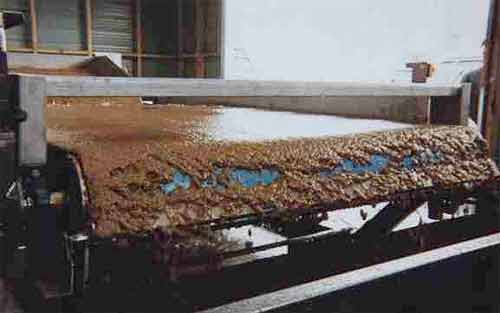
Here is my search:
If the link breaks in the mail, here is the search in short form:
If this does look like your plant, let me know.
Regards,
Neil
The email correspondence began with this:
william m foster sent a message using the contact form at http://frack.mixplex.com/contact. Dear Sirs - we are a recently formed group opposed to hydrofracking in the finger lakes - we would like to distribute a copy of your report to a number of organizations in cayuga county - would this be ok with you? Hello, The Marcellus Accountability Project (MAP) is here: http://www.tcgasmap.org/ It is run by Bill Podulka, an engineer at Cornell. My site does not have the authority to re-distribute original content - it serves as a digital library. I write annotations for many of the articles. You are welcome to print, email and/or link to any of the material in this collection, of which MAP is one of the articles. I try to present information that is accurate, useful and inspired in my choice of articles in the collection. The issues of hydrofracking go beyond the well sites and touch on larger environmental, health, and legal concerns. Since my mission is to curate and distribute, I welcome your inquiry and wish you Best Regards, Neil Zusman http://frack.mixplex.com
-----Original Message-----
From: Neil Zusman [mailto:info@frack.mixplex.com]
Sent: Monday, April 11, 2011 8:52 AM
To: morgan.foster@verizon.net
Subject: Re: [Info] marcellus accoutability project
On 4/11/11 11:01 AM, Morgan-Foster Agency wrote:
Dear Neil - thank you for responding to my request - I have contacted Mr. Podulka's group and hope he will give us a favorable reply. We came together after NY Times article indicating that Auburn's Treatment Plant "cleans" fracked water. We are going to next Thursday's 4:30 Auburn Council Meeting to try to put an end to this practice. Bill Foster
-----Original Message----- From: Neil Zusman [mailto:info@frack.mixplex.com] Sent: Monday, April 11, 2011 1:00 PM To: Morgan-Foster Agency Subject: Re: [Info] marcellus accoutability project Hello Bill, You might also wish to contact Water Hang of Toxics Targeting: http://www.toxicstargeting.com/contact_us Regards, Neil
Neil - thanks - my niece has e-mailed a letter Mr. Hang sent to Gov Cuomo concerning Auburn Plant. Will be an interesting Thursday. Bill Foster
Letter from Auburn citizens to the City of Auburn, N.Y.
We are here tonight to speak about the public notice and article that appeared in the March 31st edition of The Citizen. The public notice lists eight companies that failed to comply with the city's wastewater treatment plant regulations. Six of those companies are natural gas drilling firms. The notice states that for all of 2010, many of these natural gas companies failed to submit quarterly self-monitoring reports.
The city called their attention to it a year later. Within that time frame , the city took in over 16 million gallons of gas drilling wastewater.
The notice mentions that the companies submitted required certification that the drilling water did not come from hydraulic fracturing , or hydrofracking , in the Marcellus Shale .
Can we verify this? How do we know that this is the case apart from taking natural gas companies at their word? Is that all it is--a certificate submitted a year after the fact that the city's plant did not take a radioactive toxic mix that no wastewater treatment plant is equipped to handle?
We have little faith in the integrity of the natural gas industry.
According to a March 1 article in the New York times, in Pennsylvania natural gas drilling companies aren't even required to track what they dispose or where they dispose their wastewater. Chesapeake Energy, one of the companies listed in the public notice for failure to comply, is hydrofracking in Pennsylvania. We have watched as natural gas executives blatantly lied to a congressional committee that the chemicals used in hydrofracking are safe .
Chemicals like benzene, toluene, methanol, formaldehyde--known carcinogens and neurotoxins.
The natural gas industry says there is no evidence that hydrofracking has contaminated drinking water while people in Colorado, Wyoming, Pennsylvania and other states can now light their tap water on fire and suffer from severe health issues.
Bluntly put, the natural gas industry has no incentive to tell the truth. They are free from federal and state laws that protect public health and prevent hazardous materials from entering public water . These companies have been exempt from any responsibility to disclose what chemicals they use…
...We say no more.
Beth Cuddy, Terry Cuddy, Patty Beer, Bill Foster, Taylor Price, Theresa Walsh, Ann Foster, David Foster, Walt Aikman, Roger Beer, Teresa Foster, Devon Roblee, Andy Roblee, Laura Coburn, Steve Gamba, Brian Landers, Marisol Landers, Bodhi Landers, Amy Chamberlain, Jesse Reich, Peter Cramer, Diane Sauso, Chris Sauso, Dia Carabajal, Lee Ballard, Matthias Ballard, Vera Carabajal, Nate Vitale, Julie Vitale, Vanessa Carpenter, Nick Diego, Lisa Hoff, Beth Ann McCarthy, Jennifer Balyszak Herbert, Laurel Ullyette, Jennifer Kulis Starr, Dustin Orofino, Kelly L. Woodman, Don Miller, James Cantu, Jessica Cantu, Jesse Kline, Tom Yaglowski, Chuck Mason, Steve Kline, Rob Morphy, Carrie Gregg, Lois Brazak, Bradley Molloy, Jaeseena Bertot, Thomas Tracy, Matthew Smith, Joan House, Susan Marteney, Doug Ward, Renee Ward, Ian Connerly, Barbara Moody, Blaine Moody, Stephen Stomps, Steve Coleman, Judy Coleman, Rhonda Miller, Dean Aversa , Mike Trapani, Joe Librandi-Cowan, Penny Pitman, Mary Nellenback, Anne Mlod, Janah Autovino, David Autovino, Margaret Foster, Tracy Crandall Herman, Jim Van Arsdale, and Betsy Alexander,...
Mira's Movement is a pediatric cancer support and advocacy organization, dedicated to supporting families facing a childhood cancer diagnosis, as well as increasing funding of research into better treatments and the causes of childhood cancer.
Do you know that pediatric cancer is the leading disease killer of children in the United States? That 35 children are diagnosed with cancer in the US every day? Do you know that, according to the National Cancer Institute, pediatric cancer as a whole received only $200 million for research in 2009?
Not enough is being done to better understand childhood cancer—what causes it and how to better treat it. It's not because there aren't enough researchers ready to do this work. It's because there isn't enough public and private funding to move it ahead. If parents of children with cancer weren't busy taking care of them, hoping to save their lives, or grieving, they'd be able to be more vocal advocates. For these reasons, many voices are not being heard, and we're working to change that. Please join us in supporting and speaking up for kids with cancer!
Source: US Mortality Files, National Center for Health Statistics, Centers for Disease Control and Prevention and 2004 Life Tables.
See: Sandra Steingraber. Raising Elijah.
See: Poisoned profits : the toxic assault on our children
See: The Case for a Truth and Reconciliation Commission on Toxic Hazards
See: Fracking: Implications for Human and Environmental Health
See: Food and Water Watch
This weekend, as 10,000 energetic, bright young people are converging on Washington, DC, for PowerShift 2011, a geezer* is waging an all-out assault on their future.
Eighty-two-year-old Texas fossil-fuel-pushing megabillionaire T. Boone Pickens has, incredibly, essentially written a bill called the NAT GAS Act (“New Alternative Transportation to Give Americans Solutions,” H.R. 1380), to switch fleet vehicles such as buses and interstate trucks to “natural” gas.
Pickens has been working the Hill, White House, airwaves, and editorial boardrooms for some time. He’s got buddies like MSNBC’s Dylan Ratigan gushing over him and Joe Nocera writing oily op-ed odes to nat gas in the New York Times. And Pickens has somehow managed to sell President Obama and an astonishing number of Congress members on the myth that nat-gas is a homegrown wonder fuel “bridge” from dirty foreign oil to a clean energy future...
Extensive and thorough source of information on Marcellus Shale gas drilling in Pennsylvania. Non-members have limited access to some of the county and township specific information provided on well data, maps, production reports, violations, and company details. There is an option to become a guest member.
marcellusgas.org is located in Montrose, PA and can be contacted at 570-278-1994
There is an email contact form here.
About MarcellusGas.Org
The MarcellusGas.Org website was created to provide easy-to-access information pertaining to Marcellus gas wells being drilled in Pennsysylvania. The site was launched in September of 2010, with plans to substantially expand the information available in upcoming months.
MarcellusGas.Org welcomes and encourages comments, opinions, and suggestions. Please send your comments, and let us know what you think. Use our Contact MarcellusGas.Org form to send us your thoughts.
Sample Map showing horizontal directional drill located directly under the Elk Lake School in Dimock, PA. Find articles on Dimock, PA on Mixplex.









